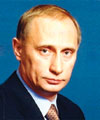International Politics
In Moscow, the season of flowers is the season of doubts. Spring 2002 has been a season of doubts in Moscow. That does not mean that President Vladimir Putin’s power has been called into doubt. With his grip firmly on the media, the Duma still subdued and oligarchs on the quiet side, the president does not look challenged – at least directly. However, Russian politics have changed since the late 1990s. People support a power that brings stability and prosperity, even if it is a bit authoritarian in its actions. What matters this spring is that economic growth looks threatened. This is the most important political event. If Russia’s economy drops again into stagnation (or maybe depression) by the end of 2002, then Putin’s image could be much more seriously tarnished. This is not to be ignored, as 2003 will be an election year for the parliament (the Duma) and 2004 will again elect the President.
Guess what? In Russia, too, "It’s the economy, stupid!" Last winter confirmed an economic slow-down. After more than 8.3% growth in 2000 and 5.7% in 2001, prospects are bleak for 2002. The government sticks by a 4% figure for 2002, as does the IMF. Remember, however, that in 1999, those 19th Street punks forecast a drop of 7% for Russia, when actual figures totaled to a gain of 5.4%. To be mistaken by more than 12 GDP points should have qualified IMF forecasters for the Guinness Book of World Records. This track record does not help to raise confidence at a time when they now forecast growth, even when one can see every economic indicator turning from green to red. Unless there is a quick change in economic policy, Russia will have no more than 2% growth this year, with depression looming for 2003. 1 Actually, nobody in Moscow would gamble on the government’s forecasts – except, of course, Prime Minister Mikhail Kasyanov and Minister of Finance Aleksey Kudrin. Such a situation might seem strange for people accustomed to equate Russian economic growth with oil prices. However, the dire fact is that oil and gas do not weigh very much as far as economic growth is concerned. As important a factor as they might be on the budget and fiscal side, hydrocarbon prices are much less relevant for economic activity than internal demand and actual rate of change, at least directly. It is true that with oil-and-gas-linked tax revenues increasing, it is easier for the Russian government to cut taxes burdening enterprises and households, alike. By doing so, this increases internal demand. Oil and gas are not irrelevant to Russia’s economic future. However, it is the exchange rate that makes the difference. The problem is clear: At 30.2 rubles/$1, the exchange rate has progressively erased all 1998 devaluation effects. Most serious Russian experts – ranging from liberal Andrei Illarionov to not so liberal people like Victor Ivanter (director of the Institute of National Economy Forecasting), Serguei Glazev, and newly appointed, prime ministerial adviser Mikhail Delyagin – would place the exchange rate at 34-to-1 or 36-to-1, to help the economy regain strength. The exchange rate does not make the difference alone. Investment, too, is critical for the future. With an investment-to-GDP ratio of 15%, Russia is far from an acceptable mark. To sustain fast growth and development, a ratio over 20%, and maybe as high as 25%, is needed. Again, most serious Russian experts agree that investment is a key to the future. Russia will invest more than it did in 2001, or about $50 billion, of which foreign, direct investments (FDI) are a mere 6%, or $3 billion. To expect something major from FDI is certainly not sound, unless one talks about very specialized investments. The economic situation is thus serious, as is the political one. Already, officials got a full dressing down by the president. Putin wants fast growth. Quite clearly, he is highly dissatisfied with governmental performances. The reform of the energy sector is not very convincing, and RAO-EES chief Anatoly Chubays got a clear rebuke. Nor did replacing the Central Bank chairman in March quicken bank reform. Putin’s appointment of a new committee (headed by Victor Ivanter) is proof that he is increasingly estranged with liberals. Last, but not least, he appointed three left-wing economists (including former Premier Primakov’s Minister of Economy, V. Masliukov, and former President Gorbachev’s adviser, N. Petrakov) to write a bill regulating the oil and gas rent, to channel hydrocarbon revenues toward more investment. Clearly, Vladimir Putin harbors serious doubts about the wisdom of liberal economic policy. The policy implemented by Kudrin and Minister of Economic Development & Trade German Greff failed to transform the post-crash rebound into fully sustainable growth. And economic growth is the very center of his policy, for tactical reasons, first. With former communists now ranking between 35% and 40% in public opinion polls, he needs to deliver significant real-life improvements before the 2003/2004 elections. Yet, growth is a strategic matter, too. Putin wants to rebuild a strong Russia. He does not expect the current warming of the U.S.-Russia relationship to remain for long. He knows, too, that China has been booming economically – not through liberal-minded economic policies or any kind of shock therapy that Harvard’s wizards are so fond of. If the government cannot convince the president that the current economic policy works, and if indicators deteriorate further, a doubting Putin will move. Forget Chechnya; forget all talks about media freedom or inquiries about 1999’s bombing. Economic growth is the central issue. If more state controls and interventions are what he thinks is the answer, we will get state controls and intervention. The energy, oil and gas sector will then be in the eye of the cyclone.
|
|||||||||||||




